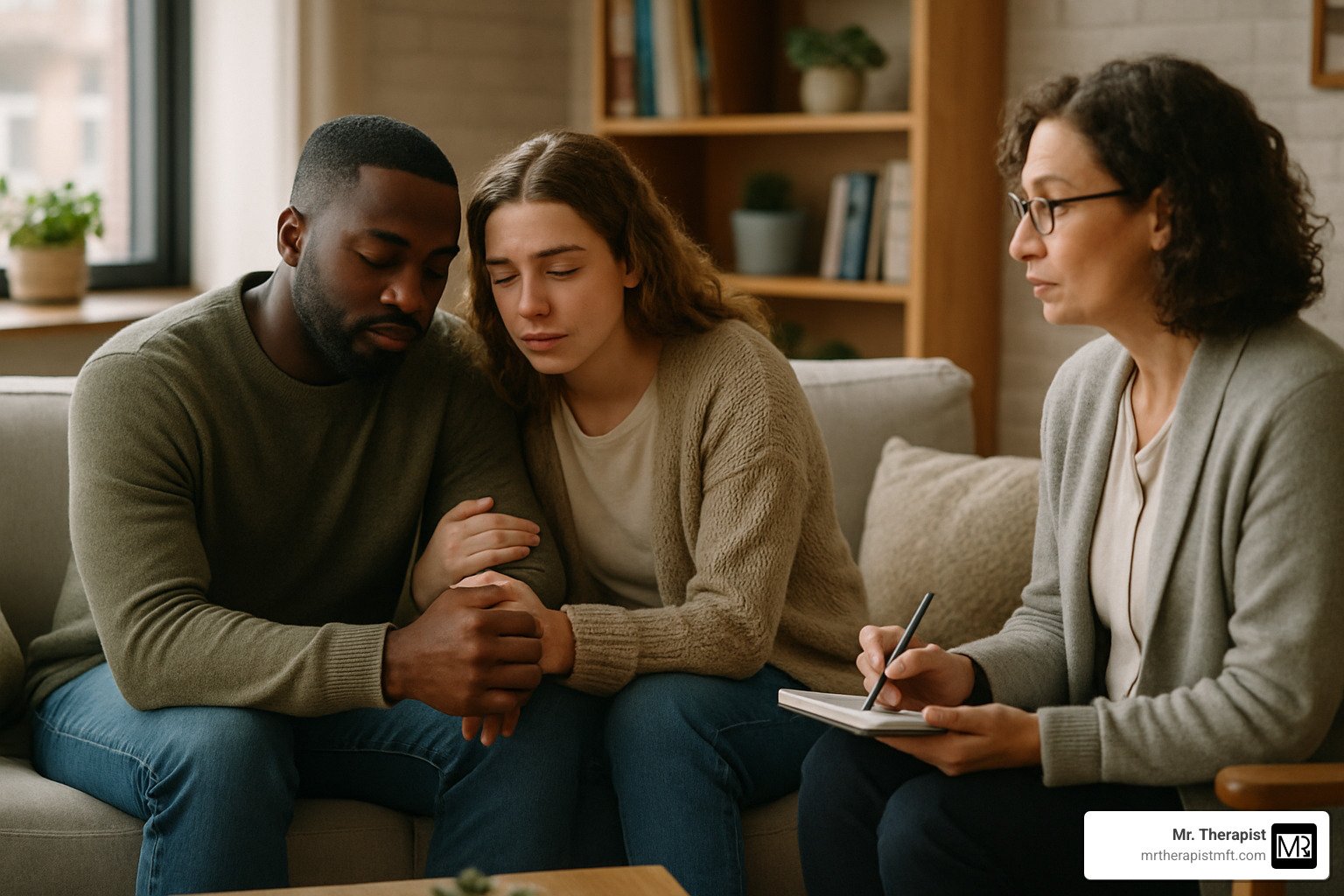
Healing Together Through Trauma
Emotion focused couples therapy for trauma survivors is a specialized approach that helps partners heal from traumatic experiences by rebuilding secure emotional bonds and creating new patterns of interaction. This evidence-based method transforms relationship distress into opportunities for deep healing and connection.
What is Emotion Focused Couples Therapy for Trauma Survivors?
- An attachment-based therapy that helps couples where one or both partners have experienced trauma
- Uses emotions as tools for healing rather than obstacles to overcome
- Creates a secure bond that serves as a buffer against trauma symptoms
- Follows a structured 3-stage process: de-escalation, restructuring bonds, and consolidation
- Shows 70% improvement in relationship satisfaction and 90% relief from trauma symptoms
When trauma enters a relationship, it can feel like an invisible third party, disrupting communication and creating cycles of distance or conflict. The echoes of past traumatic experiences—whether childhood abuse, combat exposure, accidents, or other life-altering events—often manifest in relationships through emotional numbing, hypervigilance, mistrust, and defensive patterns.
What makes this approach unique is how it harnesses the power of emotional connection as the primary healing agent. Rather than simply teaching communication skills, emotion focused couples therapy for trauma survivors creates a secure attachment bond that becomes a source of comfort, strength, and resilience.
“The key to healing trauma is comfort and protection from a loved one,” as EFT experts often note. This insight forms the foundation of the therapeutic work, where partners learn to be emotional resources for each other rather than sources of additional pain or triggers.
I’m Emmanuel Romero, a Licensed Marriage and Family Therapist with specialized training in emotion focused couples therapy for trauma survivors, helping couples transform their relationships at Mr. Therapist Counseling Services where I’ve guided numerous trauma-affected couples toward secure attachment and emotional healing.

What Is Emotionally Focused Couple Therapy (EFT)?
Emotionally Focused Therapy (EFT) was developed in the 1980s by Drs. Sue Johnson and Leslie Greenberg as a powerful approach to healing relationships. At its heart, EFT is built on attachment theory—the understanding that humans are naturally wired for emotional connection and that we depend on secure bonds with others to feel safe and whole in the world.
What makes EFT special is that it doesn’t just focus on changing behaviors or thoughts. Instead, it dives deeper into what’s really driving our relationship patterns: our emotional needs for connection, security, and comfort. When I work with couples at Mr. Therapist, I’m not just helping them argue less—I’m helping them build a secure emotional foundation that supports healing and growth.
Our approach to emotion focused couples therapy for trauma survivors combines three essential elements:
First, we focus on experiencing emotions in the present moment, helping partners tap into feelings that might be hidden beneath arguments or distance. Second, we look at how couples create and maintain their interaction patterns together. And third, we honor our fundamental human need for secure attachment—that deep sense that someone has our back.
Through this process, couples learn to recognize their negative cycles and transform them into opportunities for deeper connection. Rather than seeing emotions as problems to manage or overcome, we view them as powerful guides that can lead us back to each other.
How EFT Differs From Other Couples Therapies
When couples seek therapy, they often encounter different approaches, each with its own focus and philosophy:
Behavioral Models teach specific communication skills and conflict resolution techniques. While these skills are helpful, they often don’t address the deeper emotional needs that drive our reactions. In emotion focused couples therapy for trauma survivors, we recognize that skills training alone isn’t enough when emotional safety is missing.
Cognitive-Based Therapies focus on changing thought patterns and beliefs about the relationship. This can be valuable, but as Dr. Sue Johnson wisely notes, “Emotion, not rational thinking, is the powerful agent in change.” When we’re distressed, our emotions often override our best thinking.
Integrative Behavioral Couple Therapy (IBCT) balances acceptance and change strategies. While IBCT has strong research support, EFT places greater emphasis on changing the attachment bond itself. This focus makes EFT particularly powerful for trauma work, as it creates a healing environment within the relationship.
What makes EFT unique is that it doesn’t just teach couples to manage problems—it helps transform the relationship itself into a source of healing and security.
Core Principles & Theoretical Foundations
EFT stands on several key foundations that guide our work with couples:
Attachment Theory forms the backbone of EFT. Building on John Bowlby’s pioneering research, we understand that our need for secure attachment continues throughout our lives. Adult romantic relationships serve many of the same functions as early parent-child bonds—providing comfort, security, and a safe haven when life gets difficult.
Primary Emotions are the vulnerable, core feelings (like fear, sadness, and longing for connection) that often hide beneath our more visible reactions. In emotion focused couples therapy for trauma survivors, we help partners access these primary emotions rather than getting stuck in secondary emotions like anger or indifference that mask deeper vulnerabilities.
Negative Interaction Cycles develop when partners get caught in repetitive patterns—what we sometimes call “the dance”—where one person’s protective behaviors trigger the other’s defenses. A key part of therapy is helping couples identify and step out of these cycles.
Therapist as Secure Base means that in EFT, the therapist creates safety for both partners to explore vulnerable emotions and new ways of connecting. This role becomes especially important when working with trauma survivors, who may struggle with trust.
At Mr. Therapist, we’ve seen how these principles provide a powerful framework for couples affected by trauma. Rather than just managing symptoms, partners learn to heal together through their relationship, creating a bond that becomes a source of strength and resilience.
How Trauma Shapes Love Relationships
Trauma leaves a deep imprint on how people experience intimate connections. When trauma enters a relationship, the very bond that should offer safety and comfort can instead become a source of threat or trigger painful memories.

I’ve seen in my practice how trauma’s fingerprints appear in relationships through several channels. Emotional dysregulation often shows up as intense reactions that seem out of proportion to current situations. This happens because trauma disrupts the brain’s ability to distinguish between past dangers and present moments. A partner’s innocent comment might accidentally trigger a full trauma response.
Many survivors live with hypervigilance – remaining constantly on alert for danger, scanning their relationship for potential threats. This heightened state makes it incredibly difficult to relax into intimacy or vulnerability. As one client shared, “I want to trust that everything’s okay, but my body won’t let me believe it.”
On the flip side, emotional numbing serves as a protective shield for many trauma survivors. “It’s like there’s a wall between me and my feelings,” a client at Mr. Therapist once described. “I know my partner needs me to be emotionally present, but I just can’t access those parts of myself.” This disconnect creates profound loneliness for both partners.
Trust difficulties naturally emerge when past experiences have taught someone that vulnerability leads to harm. This isn’t a character flaw or choice—it’s an adaptive survival mechanism that helped during traumatic experiences but now interferes with healthy connection.
Common Relational Patterns After Trauma
In my work with couples affected by trauma, I consistently observe several predictable patterns:
The pursue-withdraw dance often emerges when one partner (typically the non-traumatized partner) pursues emotional connection while the trauma survivor withdraws to manage overwhelming feelings. The more one chases, the more the other retreats, creating a painful cycle that leaves both feeling misunderstood.
Blame-defend patterns develop when the trauma survivor feels triggered and blames their partner, while the partner defends themselves and feels helpless to avoid these triggers. Both end up feeling isolated in their pain, despite being right next to each other.
When both partners carry trauma histories, I often see a shutdown-shutdown pattern where both retreat emotionally, creating a relationship that feels empty despite both longing for closeness. The silence between them grows louder than words.
Perhaps most overlooked is secondary traumatization, where partners of trauma survivors develop their own trauma symptoms through witnessing their loved one’s pain. “Watching him struggle and not being able to help is its own kind of trauma,” one partner at Mr. Therapist shared with tears in her eyes.
Understanding these patterns isn’t cause for despair—they’re actually doorways to healing when approached with the right therapeutic support. Emotion focused couples therapy for trauma survivors specifically targets these patterns, changing them into opportunities for connection.
Attachment Injuries vs. PTSD Symptoms
In our work at Mr. Therapist, we carefully distinguish between two related but distinct phenomena that affect trauma-impacted relationships:
PTSD symptoms operate primarily at the individual level, including intrusive memories, nightmares, flashbacks, avoidance behaviors, hypervigilance, and emotional numbing. These personal responses to trauma inevitably spill into relationships.
Attachment injuries, however, are relationship wounds that occur when a partner is unavailable or unresponsive during moments of urgent need. These can happen as a direct result of trauma (like when a partner dissociates during an important conversation) or as separate relationship wounds (such as infidelity or abandonment during illness).
The challenge for trauma-affected couples is that these two types of wounds often interact and amplify each other. A PTSD trigger might lead to behavior that creates an attachment injury for the partner, which then becomes a new trigger for the trauma survivor. This creates a complex knot that requires careful untangling.
In my experience at Mr. Therapist, complete healing requires addressing both dimensions—the individual trauma symptoms and the relationship attachment injuries. When couples understand how trauma shapes their love relationship, they can begin the journey toward creating a bond that heals rather than retraumatizes.
Stages of emotion focused couples therapy for trauma survivors
Emotion focused couples therapy for trauma survivors follows a clear, research-backed journey that unfolds in three distinct stages. Think of it as a roadmap for healing, with each stage building naturally upon the previous one. At Mr. Therapist, we’ve guided many couples through this transformative process, watching as their relationships evolve from places of pain to sources of strength.
Stage 1 – Stabilization & De-Escalation in emotion focused couples therapy for trauma survivors
The first step of our journey focuses on creating safety and understanding the patterns that keep couples stuck. During these initial 3-5 sessions, we work to:
Build trust with both partners – especially important for trauma survivors who may approach vulnerability with caution. We take the time to hear each person’s concerns, validate their experiences, and explain how our approach can help.
We also help couples identify their unique negative cycle – the dance they’ve fallen into where one partner’s reactions trigger the other, creating a loop that neither can escape alone. For couples affected by trauma, these cycles often include trauma responses like shutting down emotionally or becoming hypervigilant.
I remember working with Lisa and Mark, where Lisa would emotionally withdraw when trauma triggers overwhelmed her. Mark, sensing her pulling away, would pursue more – which only increased Lisa’s need to withdraw. By mapping this pattern together, they began to see the cycle as their common enemy rather than each other.
Another crucial element is developing grounding techniques that help partners stay present during difficult conversations. These might be simple breathing exercises or brief time-outs when emotions become too intense.
“For the first time, I see that it’s not about me being ‘too needy’ or him being ’emotionally unavailable’ – we’re both caught in this pattern that neither of us created on purpose,” shared one client after completing this stage.
Stage 2 – Restructuring the Bond with emotion focused couples therapy for trauma survivors
Once we’ve calmed the negative cycle, we move to the heart of the work: creating new patterns of connection. This transformative stage typically spans 5-10 sessions where we:
Guide partners to access and express deeper emotions that may have been avoided, especially those connected to traumatic experiences. This happens gradually, with careful attention to each person’s sense of safety.
We also facilitate new interactions – structured conversations where partners can respond to each other’s vulnerability in supportive ways. These “enactments” create healing emotional experiences that directly counteract trauma’s impact.
I’ve witnessed powerful breakthroughs during this stage, like when Tom, a combat veteran with PTSD, finally told his wife Emily: “I’m terrified that one day you’ll see how broken I really am and you’ll leave.” Emily’s response – “I see your pain and I’m still here” – created a profound healing moment for both of them.
As the relationship becomes safer, couples can work together to understand specific trauma triggers and develop strategies to manage them together. The partner without trauma learns to become a resource rather than inadvertently triggering trauma responses.
You can explore more about the specific techniques we use during this stage on our Emotionally Focused Therapy Interventions page.
Stage 3 – Consolidation & Integration
The final stage, typically lasting 2-4 sessions, focuses on cementing the gains and preparing couples for continued growth beyond our therapy room:
Practicing new patterns becomes the focus as couples apply their new ways of interacting to ongoing issues and potential future challenges. We help ensure these new patterns are strong enough to withstand life’s inevitable stresses.
Creating a shared story of their journey together is particularly healing – how trauma affected them, how they got caught in negative cycles, and how they’ve built a more secure bond. This narrative integration plays a crucial role in healing from trauma.
Planning for continued growth involves identifying potential future triggers or challenges and developing strategies to maintain connection during difficult times.
Celebrating resilience forms an important part of this stage. As I often tell couples at Mr. Therapist, “The fact that you’ve created this healing together, despite the pain you’ve experienced, speaks volumes about your courage and commitment to each other.”
For a more detailed exploration of these stages, visit our Emotionally Focused Therapy Stages page.
Key Techniques to Rebuild Trust, Safety, and Secure Attachment
Emotion focused couples therapy for trauma survivors offers powerful techniques specifically designed to rebuild trust and create the emotional safety necessary for deep healing. These interventions directly address how trauma affects the attachment bond between partners, changing it into a source of healing rather than further pain.

Emotion Coaching & Enactments
Emotion coaching is at the heart of our work at Mr. Therapist, helping partners develop new ways to identify, express, and respond to each other’s emotional experiences:
Accessing the “Felt Sense” means moving beyond just talking about emotions intellectually. We guide partners to connect with how emotions actually feel in their bodies. This somatic awareness is especially valuable for trauma survivors, who often disconnect from bodily sensations as a protective mechanism.
“The first time I actually felt my sadness instead of just talking about it,” one client shared, “my partner could finally see what I was experiencing rather than just hearing words.”
Slowing Down Interactions creates space for deeper understanding. By taking communication at a gentler pace and focusing on moment-to-moment emotional shifts, couples learn to notice subtle cues they previously missed. This heightened awareness helps prevent the misunderstandings that can trigger trauma responses.
Guided Enactments are carefully structured interactions where partners express vulnerable feelings and needs to each other in new ways. As therapists, we’re right there to ensure emotional safety while encouraging authentic connection.
I remember working with John and Sarah after John’s infidelity triggered Sarah’s childhood abandonment trauma. Through a guided enactment, John found words for his genuine remorse and commitment while Sarah courageously shared her fear and pain. That new way of connecting became the first step in rebuilding their shattered trust.
For more on healing approaches like these, visit our guide on Healing Emotional Wounds in Relationships.
Attachment Injury Resolution
Attachment injuries—those painful moments when a partner was unavailable during times of critical need—require specific healing interventions. These wounds can result directly from trauma or from separate relationship injuries that take on greater significance in trauma’s context.
The healing process typically follows several steps:
Identifying the Injury means pinpointing specific moments that created attachment wounds. Sometimes these are dramatic events, but often they’re subtle moments when emotional connection was broken during times of vulnerability.
Processing the Impact allows the injured partner to fully express how the event affected them emotionally and what it meant about the relationship. The listening partner learns to stay emotionally present without becoming defensive—often a significant challenge that requires therapist support.
Creating Healing Responses goes beyond simple apologies. The partner who caused the injury learns to offer responses that directly address the attachment fears awakened by the injury. This demonstrates emotional presence and responsiveness in a way that rebuilds trust.
Apology Rituals provide structure for healing significant betrayals. These rituals include acknowledging the hurt, taking responsibility, expressing genuine empathy, and making a meaningful commitment to change.
At Mr. Therapist, we’ve witnessed these processes transform seemingly irreparable relationships. As one client beautifully expressed: “When he truly understood how his emotional absence affected me during my panic attack, and responded with such compassion, something shifted. I could feel my heart opening again.”
Trauma-Informed Interventions & Therapist Self-Care
Working effectively with trauma requires thoughtful adaptations to standard therapy techniques:
Titration means carefully pacing emotional exploration, with frequent check-ins to ensure the trauma survivor isn’t becoming overwhelmed. We often use the metaphor of “turning the emotional dial” gradually rather than all at once—allowing healing to happen at a manageable pace.
Grounding Techniques help clients return to the present moment when trauma responses are activated. These simple but powerful exercises engage the senses and reorient to safety, creating the conditions where emotional processing can occur without retraumatization.
Co-Regulation is perhaps the most powerful intervention we teach. Partners learn to notice signs of emotional dysregulation in each other and respond in ways that help restore calm. This partner-assisted regulation directly counteracts trauma’s isolating effects, creating a shared responsibility for emotional well-being.
Therapist Self-Regulation is equally important. Working with trauma requires therapists to maintain their own emotional balance. At Mr. Therapist, we prioritize regular supervision and self-care to prevent vicarious traumatization and ensure we provide the best possible care for our clients.
The comparison between EFT and other trauma approaches like IBCT shows that while both have value, EFT’s direct focus on attachment security offers unique advantages for trauma healing. By changing the relationship itself into a healing environment, emotion focused couples therapy for trauma survivors creates lasting change that extends well beyond the therapy room.
Evidence Base & Choosing the Right Therapist
The effectiveness of emotion focused couples therapy for trauma survivors isn’t just anecdotal – it’s backed by solid science. Understanding this research can help you make confident decisions about your healing journey.

Research on EFT Outcomes for Trauma
The numbers tell a powerful story about EFT’s effectiveness. Over 70% of couples experience significant relationship improvements after completing EFT, with these positive changes still evident years later in follow-up studies. What’s particularly remarkable is that for couples affected by trauma, nearly 90% find substantial relief from trauma symptoms through this approach.
Women with histories of childhood sexual abuse have shown particularly promising outcomes. In a groundbreaking study by Dr. Sue Johnson and colleagues, couples where the female partner had experienced childhood sexual abuse showed meaningful improvements in both relationship satisfaction and trauma symptoms after EFT treatment.
Military families have also found healing through this approach. Research with veterans and their partners demonstrates that EFT significantly reduces PTSD symptoms while simultaneously strengthening the relationship – addressing both individual suffering and relationship distress.
Perhaps most fascinating is what recent brain imaging studies have revealed. Using fMRI technology, researchers have observed that the secure attachment fostered in EFT actually changes how the brain processes threat signals. This provides a neurobiological explanation for why the approach works so well with trauma survivors – it’s literally rewiring the brain’s threat-response system.
For those who appreciate diving into the scientific literature, this research on EFCT & PTSD offers valuable insights into exactly how and why this approach facilitates healing.
Is EFT Right for Your Situation? – Assessment & Contraindications
While emotion focused couples therapy for trauma survivors offers hope for many, it’s not the right fit for every situation. Safety always comes first, which is why EFT is not appropriate when there’s ongoing domestic violence. The vulnerability required in therapy simply isn’t safe in these contexts, and individual safety planning must take precedence.
Active substance abuse can also complicate the process. The emotional availability needed for EFT work can be compromised when substance use is interfering with a person’s ability to connect authentically. In these cases, addressing the substance use – either before or alongside couples work – creates a stronger foundation for success.
In cases of severe, untreated PTSD, the intensity of symptoms might first require individual trauma therapy. Think of it as creating emotional stability before asking someone to engage in the vulnerability of couples work. At Mr. Therapist, we sometimes recommend starting with individual therapy and then transitioning to couples work when both partners feel ready.
Finally, EFT requires a certain commitment to the process from both partners. The willingness to explore emotions and patterns – even when uncomfortable – is essential for the approach to work. If one partner remains firmly closed to emotional exploration, we might recommend starting with a different approach that meets them where they are.
We take assessment seriously at Mr. Therapist, carefully evaluating each couple’s unique situation to determine whether EFT is the right approach or if another path might better serve their needs at this time.
Finding a Certified EFT Clinician
The therapist you choose can make all the difference in your EFT experience. Certification from the International Centre for Excellence in Emotionally Focused Therapy (ICEEFT) ensures your therapist has completed rigorous training, supervision, and case consultation in this specialized approach.
Beyond certification, look for specific experience with trauma. The intersection of trauma and relationship distress requires specialized knowledge that goes beyond general couples therapy training. Don’t hesitate to ask potential therapists about their experience working with situations similar to yours.
The personal connection matters tremendously in therapy. Both partners should feel comfortable with the therapist and confident in their approach. That initial consultation is valuable not just for the therapist to assess your needs, but for you to assess whether this feels like someone you can trust with your healing journey.
Practical considerations like location, scheduling flexibility, cost, and insurance coverage also play important roles in your decision. Many therapists now offer telehealth options, which can make this powerful approach more accessible, especially for couples with busy schedules or those in areas with fewer specialized providers.
At Mr. Therapist, all our EFT clinicians are certified and have specialized training in trauma-informed care. We’re passionate about making this transformative approach accessible to couples throughout California who are ready to heal together.
For more information about our relationship services, visit our Relationship Counseling page where you can learn more about our approach and how we might support your healing journey.
Frequently Asked Questions about Emotion Focused Couples Therapy for Trauma Survivors
How long does EFT take for trauma-affected couples?
When couples ask me this question in my office, I always remind them that healing is a journey, not a race. The duration of emotion focused couples therapy for trauma survivors varies based on your unique situation—the depth of trauma, current relationship struggles, and how quickly you both engage with the emotional work.
Most couples I work with at Mr. Therapist typically attend between 15-25 sessions total. We usually start with weekly meetings, then gradually space them out as you begin experiencing positive changes in your relationship. Our sessions typically last 60-90 minutes to give enough time for meaningful emotional work.
I often share Dr. Sue Johnson’s wisdom with my clients: “Healing takes the time it takes.” While some couples notice significant improvements within 8-10 sessions (especially in how they handle conflicts), creating a truly secure attachment and addressing deeper trauma effects usually requires more time. We’ll work together to find the pace that feels right for your relationship.
Can EFT address both partners’ separate trauma histories?
Absolutely—and I’ve seen beautiful healing happen when both partners have trauma histories. This situation creates both unique challenges and special opportunities for connection.
When both of you carry trauma, you might notice that emotional regulation becomes more difficult during conflicts. Sometimes one person’s trauma response can trigger the other’s, creating what feels like an emotional avalanche. Your defensive patterns might also be more deeply ingrained because they’ve been essential survival strategies.
But there’s a flip side that I’ve witnessed repeatedly in my therapy room: shared understanding of trauma’s impact often creates profound empathy between partners. There’s something powerful about both knowing what it feels like to carry these wounds. As you both heal, you’ll learn to recognize and respond to each other’s vulnerable moments with increasing sensitivity.
At Mr. Therapist, we take extra care with pacing when both partners have trauma histories. We ensure both experiences receive validation and attention. While the process might take longer, the healing that happens when two people recover together often creates an exceptionally strong bond.
What if one partner is unsure about starting therapy?
This happens more often than you might think, especially when trauma is involved. Hesitation about therapy is completely understandable—opening up about painful experiences takes courage, and trauma survivors often have legitimate concerns about vulnerability.
If your partner is reluctant, a gentle approach usually works best. Consider sharing some information about how EFT differs from other therapies they might have tried before. Our website has resources that explain the process in a non-threatening way. You might mention that EFT focuses on creating safety first, and no one is forced to discuss traumatic experiences before they’re ready.
Many couples find it helpful to schedule an initial consultation where you can both meet the therapist without committing to ongoing therapy. This gives your partner a chance to ask questions and get a feel for whether this is the right approach.
I’ve learned that timing matters tremendously. Expressing your desire for the relationship to improve while respecting your partner’s pace shows that you care about their comfort. Sometimes, one partner starting with individual therapy helps build comfort with the therapeutic process before jumping into couples work.
At Mr. Therapist, we create a welcoming, judgment-free environment where both of you can feel safe exploring the possibility of change. We understand that the first step is often the hardest, and we’re here to support you whenever you’re ready.
Conclusion
Emotion focused couples therapy for trauma survivors isn’t just another therapeutic approach—it’s a transformative journey that heals both individual trauma wounds and relationship distress. Through this process, couples create something remarkable: a secure attachment bond that becomes a wellspring of resilience long after therapy ends.
At Mr. Therapist, we’ve had the privilege of witnessing this change countless times. As one client beautifully shared after completing therapy with us: “Our relationship used to be where trauma got triggered. Now it’s where healing happens.” This simple statement captures the profound shift that’s possible when couples work together to heal.
The path isn’t always straightforward. Healing from trauma while rebuilding a relationship requires real courage—courage to face painful emotions you’ve long avoided, patience to work through deeply entrenched patterns, and commitment to creating new ways of connecting. Yet the rewards make every difficult moment worthwhile: deeper intimacy that feels safe rather than threatening, emotional freedom that allows for spontaneity and joy, and a relationship that strengthens you rather than depletes you.
If trauma’s shadow has fallen across your relationship, please know that healing is within reach. The secure bond you and your partner can create through this process becomes what Dr. Sue Johnson beautifully describes as “a safe haven and secure base”—a relationship that provides comfort during life’s storms and the confidence to explore and grow during calmer times.
Our team at Mr. Therapist, led by Emmanuel Romero, specializes in helping trauma-affected couples throughout California find their way back to each other. With offices in San Clemente and telehealth options available statewide, we’re committed to making this healing approach accessible to couples wherever they are in their journey.
Ready to take the first step? We understand how difficult reaching out can be, especially when trauma is involved. Our warm, trauma-informed approach creates a safe space for both partners to begin healing—together. Contact us today to learn how emotion focused couples therapy for trauma survivors can help you reclaim both your relationship and your sense of emotional well-being.
For more details about our approach to couples therapy, visit our page on Emotionally Focused Couples Therapy.



